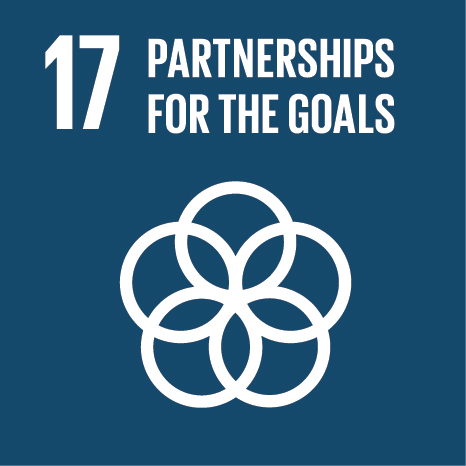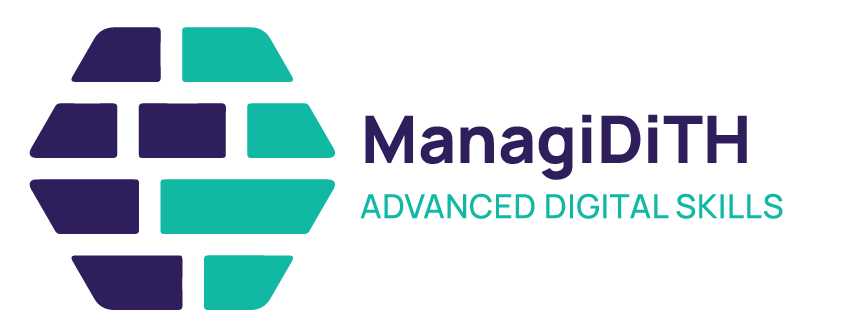The Master's Degree in Managing Digital Transformation in the Health Sector (ManagiDiTH) is an innovative initiative in the European educational panorama, the result of a project financed by the European Union and led by the School of Applied Digital Technologies (Iscte-Sintra), in collaboration with two other universities: the Laurea - University of Applied Sciences, in Finland, and the AUTH - Aristotle University of Thessaloniki, in Greece.
This Master's degree aims to train future professionals, both in the technological and healthcare areas, with essential skills to face the challenges and opportunities that the digital era brings to the healthcare sector. Given the rapid acceleration of technological development, there is an urgent need to equip professionals with the necessary tools to navigate this constantly evolving scenario.
With a multidisciplinary and innovative curriculum, the ManagiDiTH master's degree integrates three fundamental components: societal, digital and health. Furthermore, students can choose between two areas of specialization: Data Science or Interoperability. This flexibility allows each student to personalize their training according to their interests and professional aspirations. Thus, students have the opportunity to deepen their knowledge in areas such as artificial intelligence, virtual reality, automation, cybersecurity and other emerging technologies that are redefining the way healthcare services are provided and managed.
The study program, consisting of three semesters with a total of 90 ECTS, provides a solid theoretical basis combined with practical experiences and real projects in the sector. Teaching is taught in English, following the most recent pedagogical guidelines related to Distance Learning, which allows the participation of students of different origins and nationalities. The highly specialized teaching staff, coming from diverse academic and professional backgrounds, constitutes an added value of this master's degree and provides a unique opportunity for those looking to stand out in the field of digital health.
This project will bring important benefits, and will address key societal challenges in the following areas:
1. Enabling interoperable digital public services centred on the needs of users This project makes a crucial contribution in furthering the digitalisation of the health sector: need for greater healthcare capacity and efficiency within the ageing European population; need for modernisation of data management; need for growing service user expectations of digital services; urgent need for digitalisation of health services. Interoperability is vital in managing the transition to digital healthcare systems. This interdisciplinary programme will add value for IT professionals by enabling them to understand, design and work in the health sector, and for healthcare professionals by developing their technological skills and competencies. The project will make an important contribution both to the modernisation and response efficiency of the health sector, and to innovation in the university education sector. Added value for society results from the consolidation of a qualification and skills development chain that enables the adoption of new clinical and organisational practices in the health sector. These new practices are aligned with opportunities opened up by digitalisation. Example opportunities in the health sector include: the use of large volumes of information to optimise clinical procedures, consolidating preventive approaches, and increasing robustness of diagnostic procedures, and the mobilisation of information to optimise planning and resource management functions, to integrate equipment and optimise information processing and service organisation, use of ICT for remote provision of clinical services , to protect clinical data and provide greater guarantees of reliability and security for all system users . Enabling these opportunities is essential for future health services, which need to add more value to their basic services, while also increasing efficiency. The digital consolidation will enable relevant gains in the ability to act preventively in health protection, using data to anticipate and mitigate risks. The better use of available data will also contribute to being more precise and quicker in diagnosing and prescribing treatments. These opportunities require the systematic and organised use of new skills by health systems. Efficiency in care management and resource planning will also benefit from the incorporation of greater competence in the areas of information production and management. Interoperability between equipment and systems is part of this process and also supports the reformulation of forms of service provision. All these changes need active communication inside of the larger ecosystem, which permits knowledge creation between quadruple helix partners, where the project partners can be facilitators in each region, and also across the different countries.
2. Promoting an inclusive and trustworthy digital space A core aim of the project is to develop inclusive and trustworthy digital healthcare systems. By bringing together professionals from healthcare and social sectors, and technology professionals, the needs of patients and service users will be better incorporated into the design of digital technologies for the health sector. The inclusion of sectoral healthcare providers and healthcare professionals as consortium partners will ensure that a patientfocused and human-centric approach to digital healthcare design and delivery will be prioritised in the programme teaching, and in scope of research placements offered. The triple focus of health sector organisations, digital skills and societal skills (see Figure 1 above) illustrates how social, healthcare and technological priorities will be integrated to promote a person-focused digital transformation of the health sector. As demonstrated in the COVID19 pandemic, digitalisation of systems can marginalise already excluded groups and individuals, and the need to design healthcare services in ways that enable users with a range of needs and disabilities will be embedded into this programme, drawing on insights from psychology, sociology, healthcare and other person-focused disciplines. Inclusivity will also be attended to in the recruitment of staff and students. The inclusion of both ICT and healthcare sectors is likely to result in a diverse staff and student body in terms of gender, age, and social and economic backgrounds. 50% of students accepted on the programme will be women (see Section 3.1). The programme will be monitored to ensure diversity is included at recruitment, appointment, and during the programme. Putting the citizen at the centre of the system and personalising care requires greater and better knowledge, but also the ability to provide services more conveniently. Telemedicine opens up new possibilities, now that the social context is more receptive to the digitalisation of work organisation. In the health sector, the demands of reliability and rigour give impetus to mobilising skills to bring about this change. The project aims to respond to these societal dynamics, enabling healthcare to be organised in a more convenient way for citizens. To achieve these objectives, it will be vital to engage actively with regional partners from universities, research. industry, government and civil society, at RIS3 and at the EU level.
In summary, it is expected that the project will reinforce quality, optimize resources, and address user needs and demands in the healthcare sector. This is a central societal need as Europe moves on from the COVID-19 pandemic.
| Research Centre | Research Group | Role in Project | Begin Date | End Date |
|---|---|---|---|---|
| Iscte | -- | Leader | 2023-01-01 | 2026-12-31 |
| Institution | Country | Role in Project | Begin Date | End Date |
|---|---|---|---|---|
| LAUREA-AMMATTIKORKEAKOULU OY (LAUREA) | Finland | Partner | 2023-01-01 | 2026-12-31 |
| ARISTOTLE UNIVERSITY OF THESSALONIKI (AUTH) | Greece | Partner | 2023-01-01 | 2026-12-31 |
| UNIVERSITE GUSTAVE EIFFEL (UNI EIFFEL) | France | Partner | 2023-01-01 | 2026-12-31 |
| Instituto de Telecomunicações IT-IUL (IT-IUL) | Portugal | Partner | 2023-01-01 | 2026-12-31 |
| CLINIPOWER FINLAND OY (Clinipower) | Finland | Partner | 2023-01-01 | 2026-12-31 |
| WHYMOB LDA (Whymob) | Portugal | Partner | 2023-01-01 | 2026-12-31 |
| MUNDISERVICOS - COMPANHIA PORTUGUESA DE SERVICOS E GESTAO LDA (MundiConsulting) | Portugal | Partner | 2023-01-01 | 2026-12-31 |
| Name | Affiliation | Role in Project | Begin Date | End Date |
|---|---|---|---|---|
| Maria do Carmo Gomes | Associate Researcher (CIES-Iscte); | Coordinator and Executive Director | 2023-01-01 | 2026-12-31 |
| Paulo Feliciano | Associate Researcher (CIES-Iscte); | Global Coordinator | 2023-01-01 | 2023-10-31 |
| Janet Smithson | -- | Work Package Leader | 2023-01-01 | 2026-12-31 |
| Joao C Ferreira or Joao Ferreira | Professor Auxiliar (com Agregação) (DTDA); Integrated Researcher (ISTAR-Iscte); | Master's Coordinator | 2023-01-01 | 2026-12-31 |
| Margarida Santos | Professora Auxiliar Convidada (DCSE); | Master's Coordinator | 2023-01-01 | 2026-12-31 |
| Ana Lúcia Henriques Martins | Professora Associada (DMOG); Integrated Researcher (BRU-Iscte); | Researcher | 2023-01-01 | 2026-12-31 |
| Carlos Serrão | Professor Associado (DTDA); Integrated Researcher (ISTAR-Iscte); | Researcher | 2023-01-01 | 2026-12-31 |
| Diana Elisabeta Aldea Mendes | Professora Associada (DMQGE); | Researcher | 2023-01-01 | 2026-12-31 |
| Henrique Martins | Professor Associado (DCSE); Integrated Researcher (BRU-Iscte); | Researcher | 2023-01-01 | 2026-12-31 |
| Joana Martinho Costa | Professora Associada (DCSE); Integrated Researcher (ISTAR-Iscte); | Researcher | 2023-01-01 | 2026-12-31 |
| Leonor Domingos | Professora Auxiliar (DTDA); Integrated Researcher (ISTAR-Iscte); | Researcher | 2023-01-01 | 2026-12-31 |
| Maria José Sousa | Professora Associada (com Agregação) (DCPPP); Integrated Researcher (BRU-Iscte); | Researcher | 2023-01-01 | 2026-12-31 |
| Marlon Santos | Research Assistant (DINAMIA'CET-Iscte); | Researcher | 2023-01-01 | 2026-12-31 |
| Nuno Nunes | Professor Auxiliar (DCSE); Integrated Researcher (CIES-Iscte); | Researcher | 2023-01-01 | 2026-12-31 |
| Nuno David | Professor Associado (DCTI); Integrated Researcher (DINAMIA'CET-Iscte); | Researcher | 2023-01-01 | 2026-12-31 |
| Patrícia Engrácia | Professora Auxiliar (DCSE); Associate Researcher (ISTAR-Iscte); | Researcher | 2023-01-01 | 2026-12-31 |
| Patrícia Salgueiro | -- | Researcher | 2023-01-01 | 2026-12-31 |
| Pedro Joaquim Amaro Sebastião | Professor Catedrático (DTDA); Integrated Researcher (IT-Iscte); | Researcher | 2023-01-01 | 2026-12-31 |
| Ricardo Paes Mamede | Pró-Reitor; Professor Associado (DEP); Integrated Researcher (DINAMIA'CET-Iscte); | Researcher | 2023-01-01 | 2026-12-31 |
| Rúben Filipe de Sousa Pereira | Professor Auxiliar (DCTI); Integrated Researcher (IT-Iscte); | Researcher | 2023-01-01 | 2026-12-31 |
| Tomás Gomes Silva Serpa Brandão | Professor Auxiliar (DCTI); Integrated Researcher (ISTAR-Iscte); | Researcher | 2023-01-01 | 2026-12-31 |
| Luís B. Elvas | Professor Auxiliar (DCSE); Research Assistant (ISTAR-Iscte); | Research Assistant | 2023-01-01 | 2026-12-31 |
| Reference/Code | Funding DOI | Funding Type | Funding Program | Funding Amount (Global) | Funding Amount (Local) | Begin Date | End Date |
|---|---|---|---|---|---|---|---|
| DIGITAL-2021-SKILLS-01 (Project 101083896) | -- | Scholarship | European Commission - Digital Europe Programme | 5.897.696 | 1.430.139 | 2023-01-01 | 2026-12-31 |
No records found.
No records found.
No records found.
No records found.
No records found.
With the objective to increase the research activity directed towards the achievement of the United Nations 2030 Sustainable Development Goals, the possibility of associating scientific projects with the Sustainable Development Goals is now available in Ciência_Iscte. These are the Sustainable Development Goals identified for this project. For more detailed information on the Sustainable Development Goals, click here.

 Português
Português





